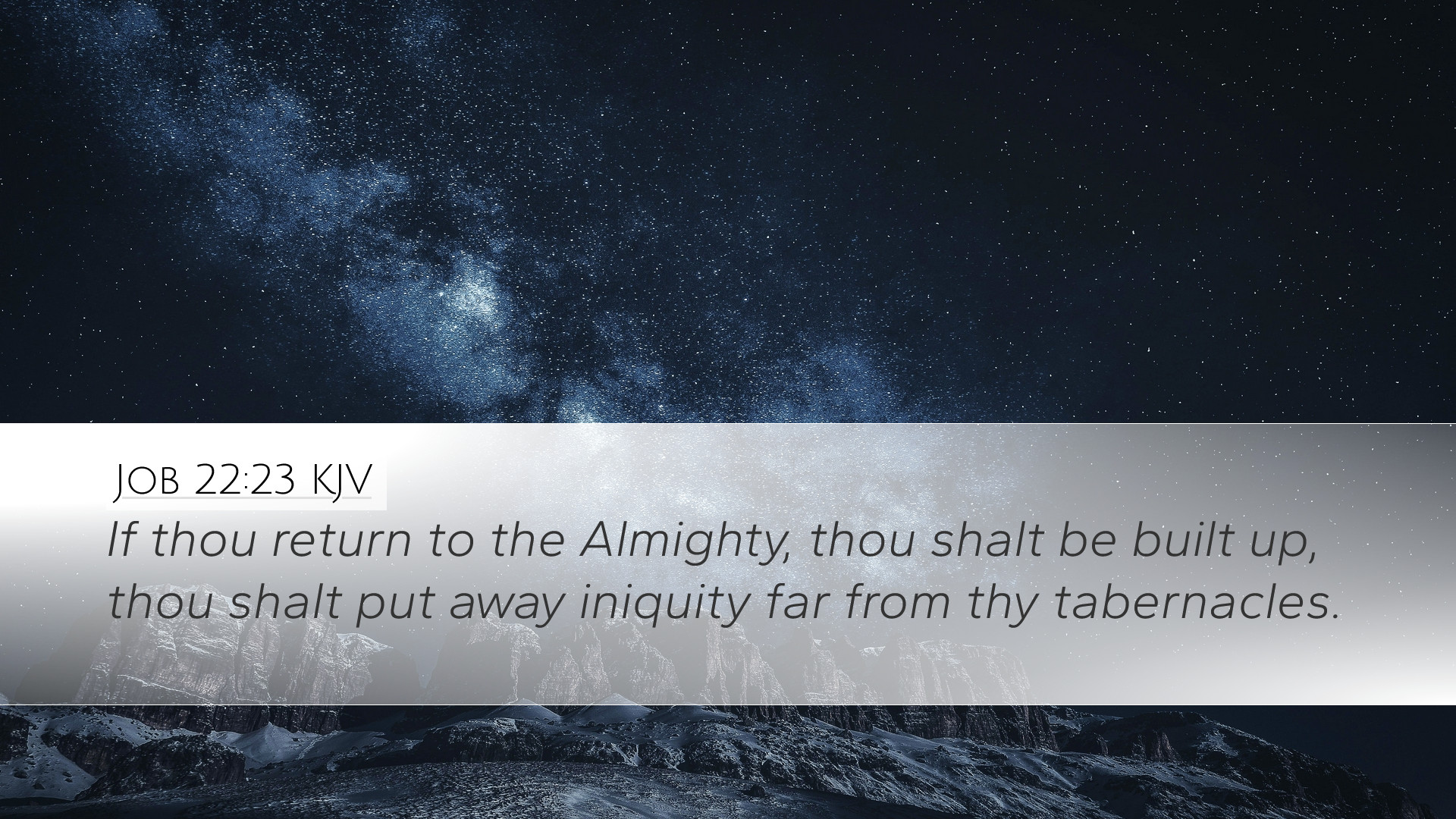Old Testament
Genesis Exodus Leviticus Numbers Deuteronomy Joshua Judges Ruth 1 Samuel 2 Samuel 1 Kings 2 Kings 1 Chronicles 2 Chronicles Ezra Nehemiah Esther Job Psalms Proverbs Ecclesiastes Song of Solomon Isaiah Jeremiah Lamentations Ezekiel Daniel Hosea Joel Amos Obadiah Jonah Micah Nahum Habakkuk Zephaniah Haggai Zechariah MalachiJob 22:23
Job 22:23 KJV
If thou return to the Almighty, thou shalt be built up, thou shalt put away iniquity far from thy tabernacles.
Job 22:23 Bible Commentary
Commentary on Job 22:23
Job 22:23: "If thou return to the Almighty, thou shalt be built up; thou shalt put away iniquity far from thy tabernacles."
Introduction
The verse from Job 22 presents a significant call to repentance and return to God, characterized as the Almighty. This commentary draws insights from various public domain sources, allowing a deeper exploration of the theological and pastoral nuances present within the text. The context of Job’s trials and the dialogues with his friends set the stage for this poignant instruction from Eliphaz.
Contextual Background
The book of Job addresses the themes of suffering, divine justice, and the nature of true righteousness. Eliphaz, one of Job's friends, delivers a counsel that reflects a common belief regarding suffering: that it is often a result of personal sin. The text invites reflection on the attitudes towards sin and the necessity of repentance as a pathway toward restoration.
Insights from Matthew Henry
Matthew Henry emphasizes the importance of returning to God, pointing out that the return must be genuine and heartfelt. He states that returning involves not merely external acts but an internal metamorphosis where one's heart turns back to God in true repentance.
- The Call to Repentance: Henry stresses that repentance is the first step toward experiencing restoration. The phrase "return to the Almighty" signifies a turn away from sin towards God, which is foundational for spiritual healing.
- Restoration with God: He elaborates that such a return will lead to being "built up," indicating a promise of divine restoration of both the spirit and circumstances. He interprets this as being fortified against the adversities of life.
- Iniquity as a Barrier: Henry reflects on the necessity of putting away iniquity, indicating that sin creates a barrier in one’s relationship with God. The "tabernacles" reference implies the sanctity of one’s personal life and community, highlighting the collective aspect of sin and its impact.
Insights from Albert Barnes
Albert Barnes provides a more practical interpretation of the call in Job 22:23, noting that returning to God involves several critical aspects:
- A Conscious Decision: Barnes posits that returning signifies a conscious decision to abandon iniquity. The active language of "putting away" suggests that one must actively engage in separating themselves from sinful behaviors and thoughts.
- Divine Assurance: Barnes highlights the assurance that follows the act of repentance. The promise of being "built up" implies that God is not only able but willing to restore those who genuinely seek Him.
- The Role of Faith: He points out that this verse reflects a broader theme of faith and reliance on God's mercy, illustrating that faith leads to spiritual revitalization and fortitude.
Insights from Adam Clarke
Adam Clarke adds a rich layer of hermeneutical insight by analyzing the linguistic and theological implications of Job 22:23:
- Linguistic Analysis: Clarke examines the original Hebrew terms, emphasizing that "return" (שוב) denotes a reversal of one's direction, thus encapsulating the essence of true repentance.
- Theological Implications: He notes the depiction of God as the "Almighty," which underscores the power and sovereignty of God in the act of restoration and the seriousness of sin, calling for humility in the face of divine authority.
- Inward Renewal: Clarke suggests that to “put away iniquity” is not only an outward action but also entails an inward renewal of spirit, which reflects the holistic approach to repentance central to biblical theology.
Theological Implications
This verse encapsulates several theological themes relevant for pastoral and scholarly discussions:
- Repentance and Restoration: The necessity of repentance as an integral aspect of Christian doctrine is reaffirmed, showcasing the path to spiritual wholeness and health.
- God's Sovereignty: The reference to God as the "Almighty" asserts the theme of His ultimate authority over human affairs and the recognition of divine power as crucial to understanding our place in repentance.
- Holiness and Community: The call to remove iniquities from "thy tabernacles" implies a corporate dimension to sin, encouraging believers to cultivate holiness within both personal and communal worship settings.
Pastoral Applications
For pastors and leaders, the message from Job 22:23 is both a challenge and an encouragement:
- Encouragement to Conformity to God’s Will: Leaders are encouraged to guide their congregations toward a deeper commitment to returning to God, emphasizing that true repentance can lead to profound changes in individual lives and communities.
- Laying the Groundwork for Restoration: Pastoral care should be focused on helping individuals navigate their personal struggles with sin, promoting a culture where accountability and prayer are central.
- Creating Safe Spaces: It’s essential to create an environment in which believers feel safe to confess and turn away from sin, thereby nurturing a community reflective of God’s grace and restoration.
Conclusion
Job 22:23 serves as a timeless reminder of the necessity of returning to God amidst trials and tribulations. It encapsulates the vital themes of repentance, restoration, and divine authority, echoing through the ages as a guidepost for believers. This verse invites reflection and action, urging every reader—whether a pastor, student, theologian, or scholar—to engage seriously with the implications of returning to the Almighty and the profound promise of being built up in Him.


